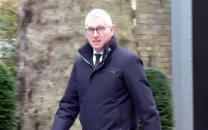Slap fighting raises concerns over brain injuries among medical experts
Experts are warning about the high risk of brain injuries in slap fighting, calling it a dangerous combat sport.
1727264986-0/Copy-of-Untitled-(22)1727264986-0-640x480.webp)
Slap fighting, a relatively new combat sport, is raising alarm among medical professionals due to the severe risk of brain injuries associated with the game.
Neurologists have reviewed footage from the first televised professional slap fighting contest in the United States and found that the likelihood of internal brain trauma is worryingly high.
Slap fighting involves two individuals standing face to face, taking turns striking each other’s faces with open hands as hard as possible.
The participants are not allowed to defend themselves or wear any protective gear on their heads, which adds to the risk of serious injuries.
According to medical experts, the potential for neurological damage is substantial, and strategies need to be developed to prevent permanent brain damage.
Doctors have compared the injuries sustained in slap fighting to those seen in other contact sports, but with a greater emphasis on direct blows to the head.
This has led to calls for stricter regulations and safety measures to be implemented to protect participants from long-term harm.
Neurologists are urging authorities to take the risks seriously and to introduce methods to reduce the impact on the brain.
With slap fighting gaining popularity, these concerns are becoming more pressing.
Neurologists from the University of Pittsburgh and the VA Pittsburgh Healthcare System observed signs of concussions in nearly 30% of the 333 slaps they analyzed, with contestants often showing symptoms like vacant stares, slowness in getting up, loss of motor coordination, and even seizures.
Of the 56 contestants studied, 44 displayed at least one sign of a concussion, and 20 exhibited signs of a second concussion during the competition.
The findings suggest that slap fighting could result in traumatic brain injuries with potentially long-term consequences.
While these conclusions are based on visible signs of concussions rather than formal diagnoses, the risks are undeniable.
Experts like neurologist Raj Swaroop Lavadi have expressed concerns over the sport, noting that while it may seem entertaining, it poses significant risks to participants' neurological health.
Other medical professionals, such as neuroscientist Christopher Nowinski and neurologist Nikolas Evangelou, have echoed these concerns.
Nowinski highlighted how one contestant displayed a fencing posture, a reflex commonly associated with severe brain injury, after being slapped, calling the sport "pure exploitation."
The neurologists are now working on further studies, including the use of mouthpieces to measure the impact of slaps, in hopes of raising awareness and improving safety standards in this dangerous sport.


















COMMENTS
Comments are moderated and generally will be posted if they are on-topic and not abusive.
For more information, please see our Comments FAQ